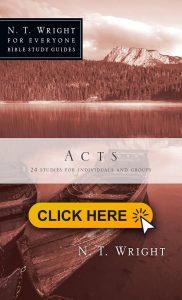To begin, I want to thank all the participants for such great questions. I do agree with Osborne that the historical background provides a three-dimensional aspect to a sermon or any biblical teaching. The question posed regarding the dangers on delivering a message on the Johannine Comma or the woman caught in adultery is quite interesting. First, the primary issues that surround John 8:1-11 and 1 John 5:7-8 are text critical, which Osborne categorizes under the literary context, and specifically under grammar. Accordingly, the primary danger associated with delivering a message on the two passages is to ignore that fact that John 8:1-11 was a likely addition, and 1 John 5:7-8 is almost certainly not part of the original manuscripts. By ignoring the text critical concerns, the individuals in the congregation who are aware of the issues could lose confidence in the teacher. Furthermore, any attempt to “protect” the congregation from the text critical issues would not only be unnecessary, but also extend a condescending attitude towards the capacity of the listeners. Alternatively, by highlighting the inerrancy of the original manuscripts and explaining the overwhelming accuracy of the Bible based on recent textual scholarship, the pastor has the opportunity to enhance Scripture’s trustworthiness.
The next challenge is how the pastor would utilize historical and cultural background information to illuminate these verses if, after considering the textual issues, the sermon addressed either of the passages. John 8:1-11 may be the most appropriate text to preach because it likely has historical veracity. Furthermore, the historical background of the passage could be quite enlightening. First, as Osborne explains, the Old Testament can provide important background material. In this case, Scriptures that reference the topics of adultery and stoning, such as Deuteronomy 17:6, 22:22, and Leviticus 20:10, would both provide a historical backdrop to the pericope. Second, Roman law provides insight into the cultural milieu, which forbids execution without the governor’s approval. By highlighting the historical and cultural background, Craig Keener explains that the trap is set: If Jesus does not approve the execution, He violates the Mosaic law, but if Jesus approves the execution, He violates the Roman law.[1] The danger of ignoring the historical and cultural background is to miss the snare that shines the spotlight on Jesus’ famous punchline, which is a missed teaching opportunity
Next, the perceived contradiction between Matthew 27:5 and Acts 1:18 must not be ignored, regardless whether a conversation with the married couple occurred or not. Again, the pastor’s credibility is at risk. If the pastor ignores the contradiction and a congregant later recognizes the issue, the individual may wonder what else the pastor is “hiding.” I remember one of my seminary professors stating, “People should not be protected from their Bible.” I agree. My goal would be to explain three aspects of the issue: (1) some perceive a contradiction, (2) some attempt to harmonize the two passages, and (3) some simply do not find it bothersome. First, it appears that Matthew suggests that Judas died from hanging, and Luke suggests that Judas died from his bowels bursting. Second, Joseph Fitzmyer explains that a harmonization is possible if the reader assumes that the rope broke from the hanging, and Judas’ bowels burst upon landing.[2]Finally, N. T. Wright suggests that “since nobody in the early church attempted to tidy things up we probably shouldn’t try either.”[3] Regardless of the options, the pastor has the opportunity to communicate that, although we may not currently have all the information necessary to harmonize every piece of Scripture, if all the information was available, the coherence and consistency of God’s Word would stand.
____________________________________________
[1] Craig S. Keener, The Gospel of John: A Commentary (Grand Rapids: Baker Academic, 2003), 1:737.
[2] Joseph A. Fitzmyer, The Acts of the Apostles: A New Translation with Introduction and Commentary (New Haven: Yale University, 2010), 31:224.
[3] N. T. Wright, Acts for Everyone: Part 1 (Louisville: Westminster John Knox, 2008), 18.
Bibliography
- Fitzmyer, Joseph A. The Acts of the Apostles: A New Translation with Introduction and Commentary. Vol. 31. New Haven: Yale University, 2010.
- Keener, Craig S. The Gospel of John: A Commentary. Vol. 1. Grand Rapids: Baker Academic, 2003.
- Wright, N. T. Acts for Everyone: Part 1. Louisville: Westminster John Knox, 2008.



